Welcome to the world of vegan pizza delights! Whether you're a dedicated vegan or simply looking to explore plant-based options, we have the perfect recipe and toppings for you. In this post, we'll share a mouthwatering vegan pizza dough recipe that forms the foundation of a deliciously crispy crust. And that's not all! We'll also unveil a collection of popular veggie Italian toppings that will take your pizza experience to new heights. Get ready to indulge in the irresistible combination of homemade vegan dough and flavorful plant-based toppings for a truly satisfying and guilt-free pizza feast. Let's dive in!

Pizza is probably the most popular main dish here in Italy. Here, pizza holds a place of culinary significance akin to bread in Western countries. While pizza is universally known, the perceptions of what is acceptable and what isn't in its preparation and consumption vary greatly.
Even within Italy, regional differences come into play, influencing every aspect of its creation – from the dough ("impasto") to the sauce, cheese, flour choices, rising techniques, and even cooking methods (yes, there's even fried pizza!).
The diversity is astounding, showcasing the endless possibilities in crafting a vegan pizza crust that caters to individual preferences. Let's explore the rich tapestry of Italian pizza-making traditions together!
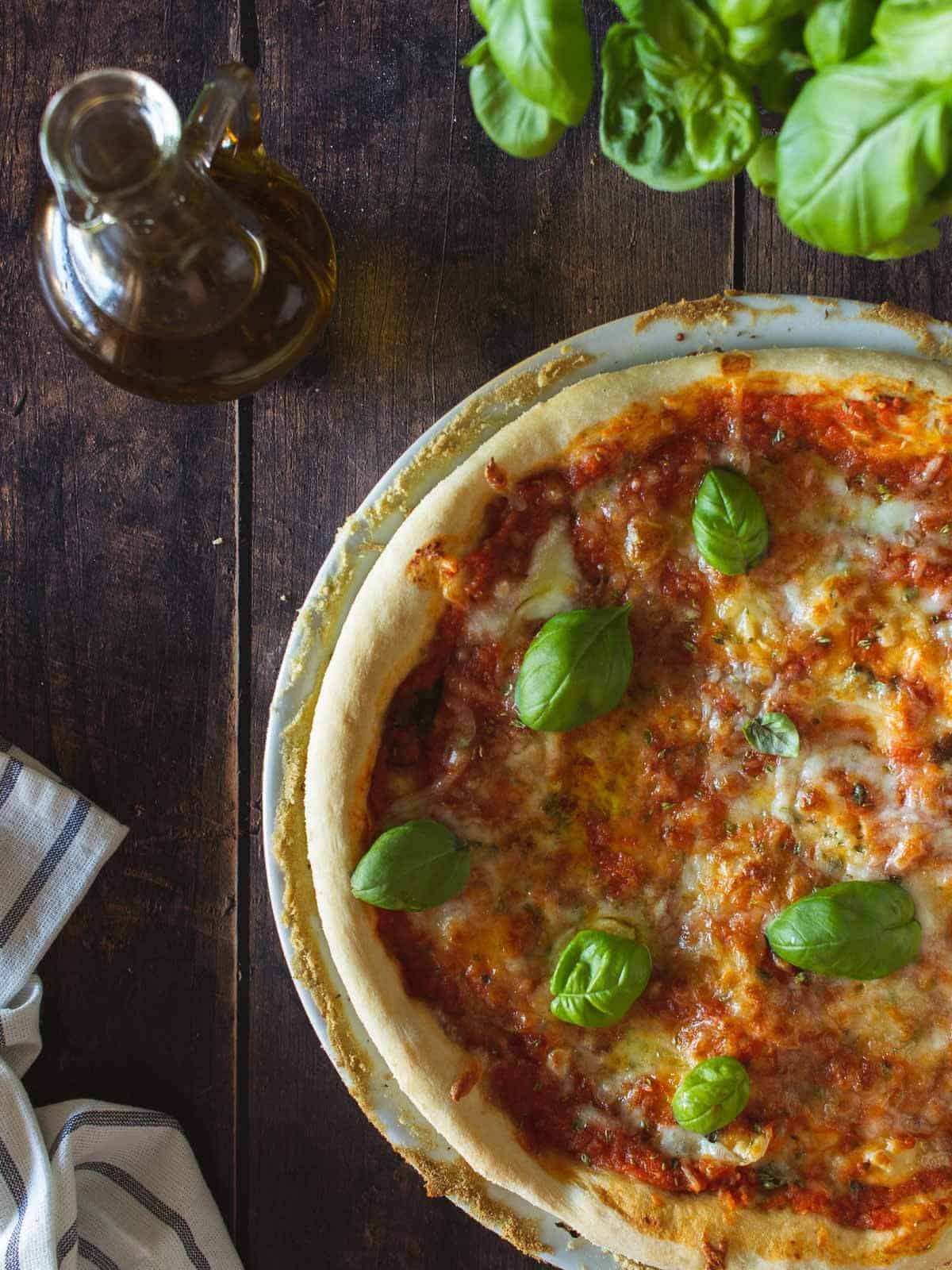
Jump to:
🧾 Vegan Cheese Pizza Ingredients
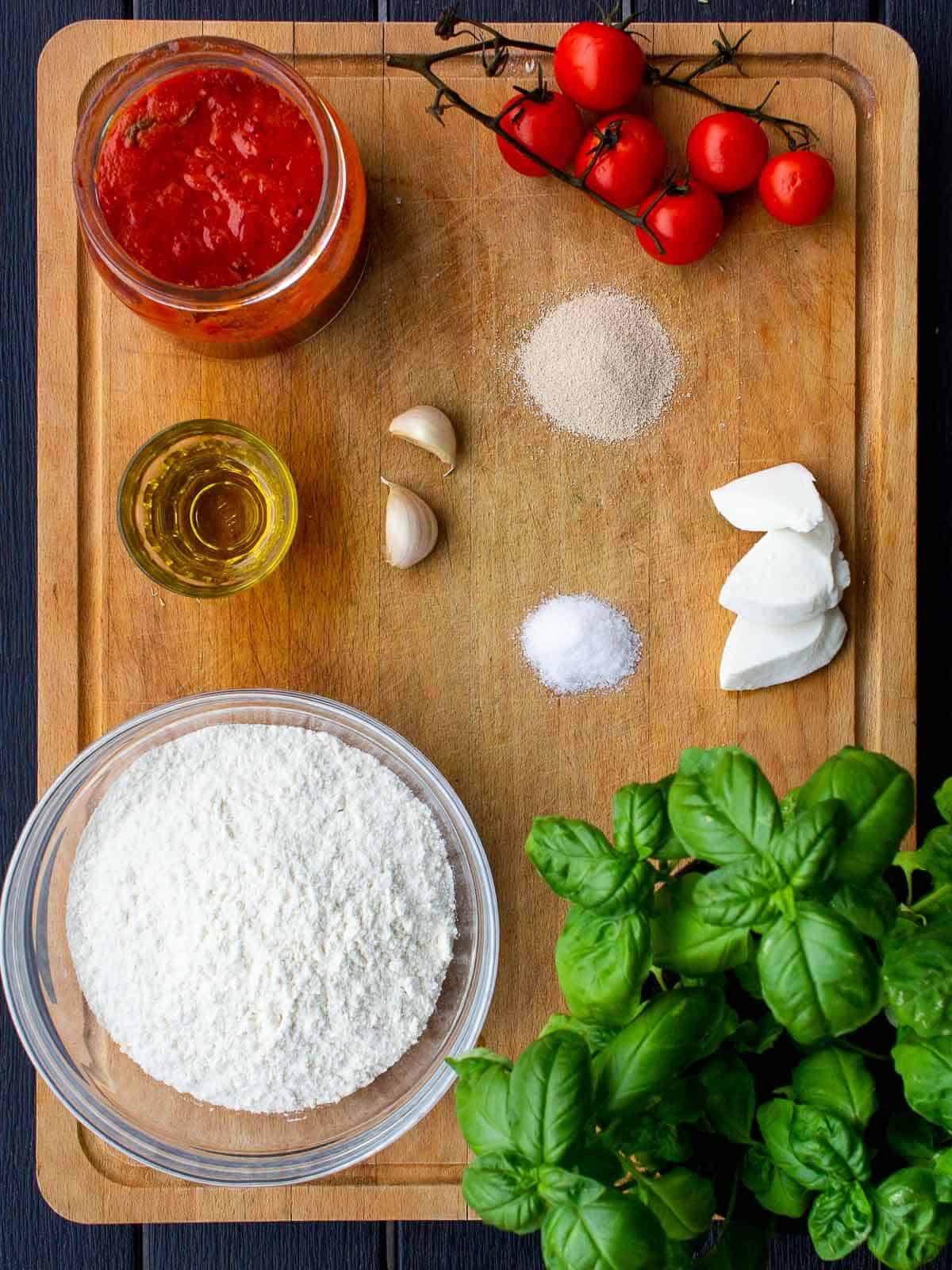
Here's a bulleted list explaining the purpose of each ingredient in the recipe:
- 0 flour: Used as the base ingredient for the pizza dough, providing structure and texture to the crust.
- Full of strong Manitoba flour: Provides additional strength and elasticity to the dough, resulting in a chewy and sturdy crust.
- Extra virgin olive oil: Adds richness and flavor to the dough while also contributing to a tender texture.
- Sea salt: Enhances the overall flavor of the dough and balances the sweetness of other ingredients.
- Cane sugar: Helps activate the yeast and gives the dough a hint of sweetness. It is common to have people to use honey to make their pizza crust, but any sugary ingredient can help achieve the same effect, so to make pizza dough vegan simply ditch the honey. Feeding sweet-tooth and always hungry yeasts.
- Dry brewer's yeast (active dry yeast): Acts as a leavening agent, causing the dough to rise and create a light and airy crust.
- Warm water: Combined with the yeast and sugar, it activates the yeast and helps in the fermentation process, resulting in a well-risen dough.
- Vegan Mozzarella cheese: Provides a creamy and melty texture to the pizza, mimicking the traditional mozzarella for a satisfying plant-based alternative.
- Parmesan cheese: Adds a savory and nutty flavor to the pizza, enhancing the overall taste profile.
🥣 Instructions
Making a pizza is actually very easy; you just need to know various tips and consider them from the start. Otherwise, you will always be asking yourself what went wrong this time.
How to make vegan pizza dough
While visiting our family in the US, we have found that King Arthur Unbleached Bread Flour works perfectly.
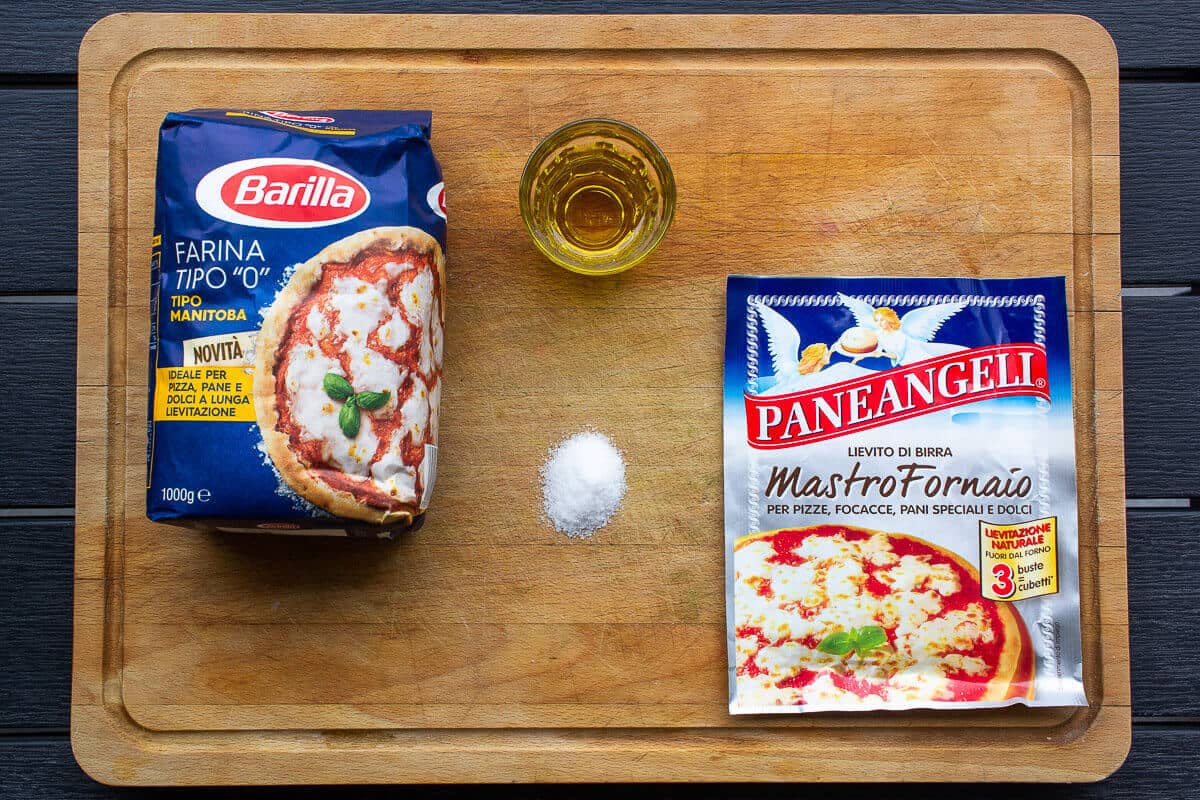
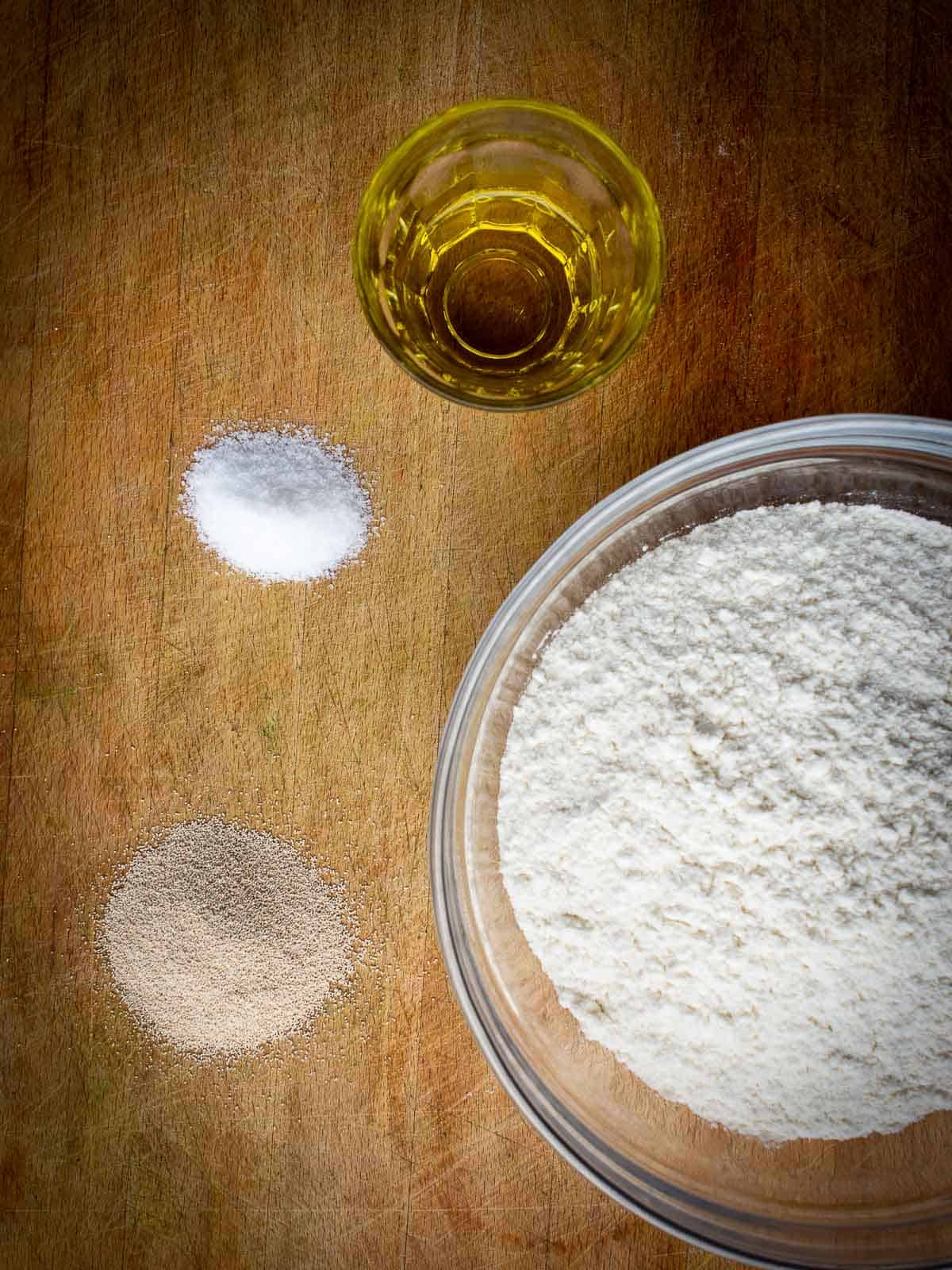
Luckily the traditional pizza dough is vegan! I strongly recommend reading the pro tips along with Yeast and Flour Section below.
- Dilute the sugar and instant yeast in the water. Let it rest for 10 minutes. You should see some bubbles on top of the mix.
- Meanwhile, mix 14 ounces (400 grams) of flour, two-thirds of the semolina, salt, and olive oil in a bowl.
- Add the yeast mixture. Mix it. It should be sticky but manageable. Bring on additional flour gradually if you have a hard time kneading the dough.
- Remove from the large bowl, stretch, and fold it for 20 minutes on a lightly floured surface, adding the remaining flour if needed. You could use a stand mixer with the dough hook appliance instead.
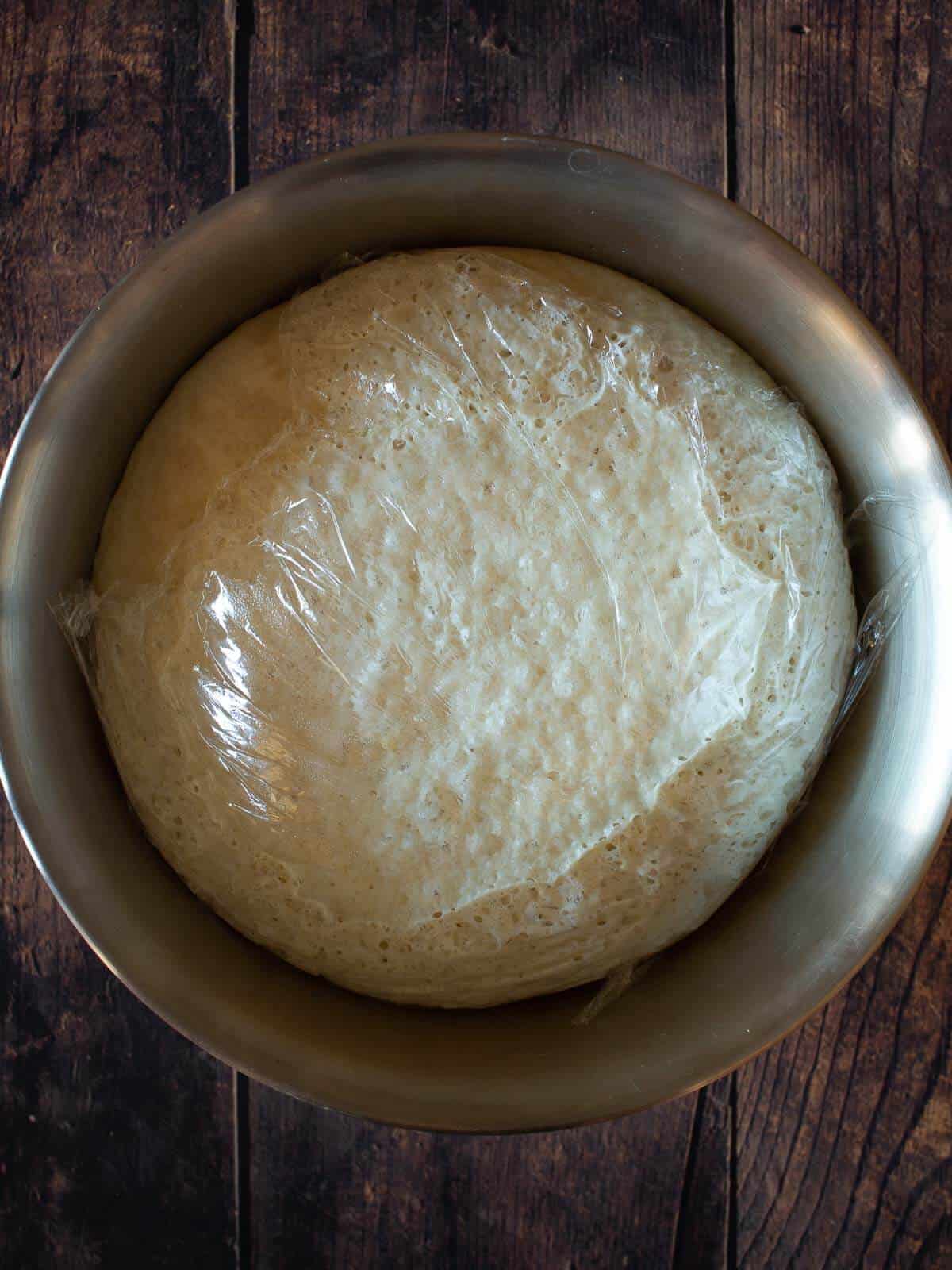
Let the dough rise in a bowl covered with a little olive oil and cling in an oiled bowl.
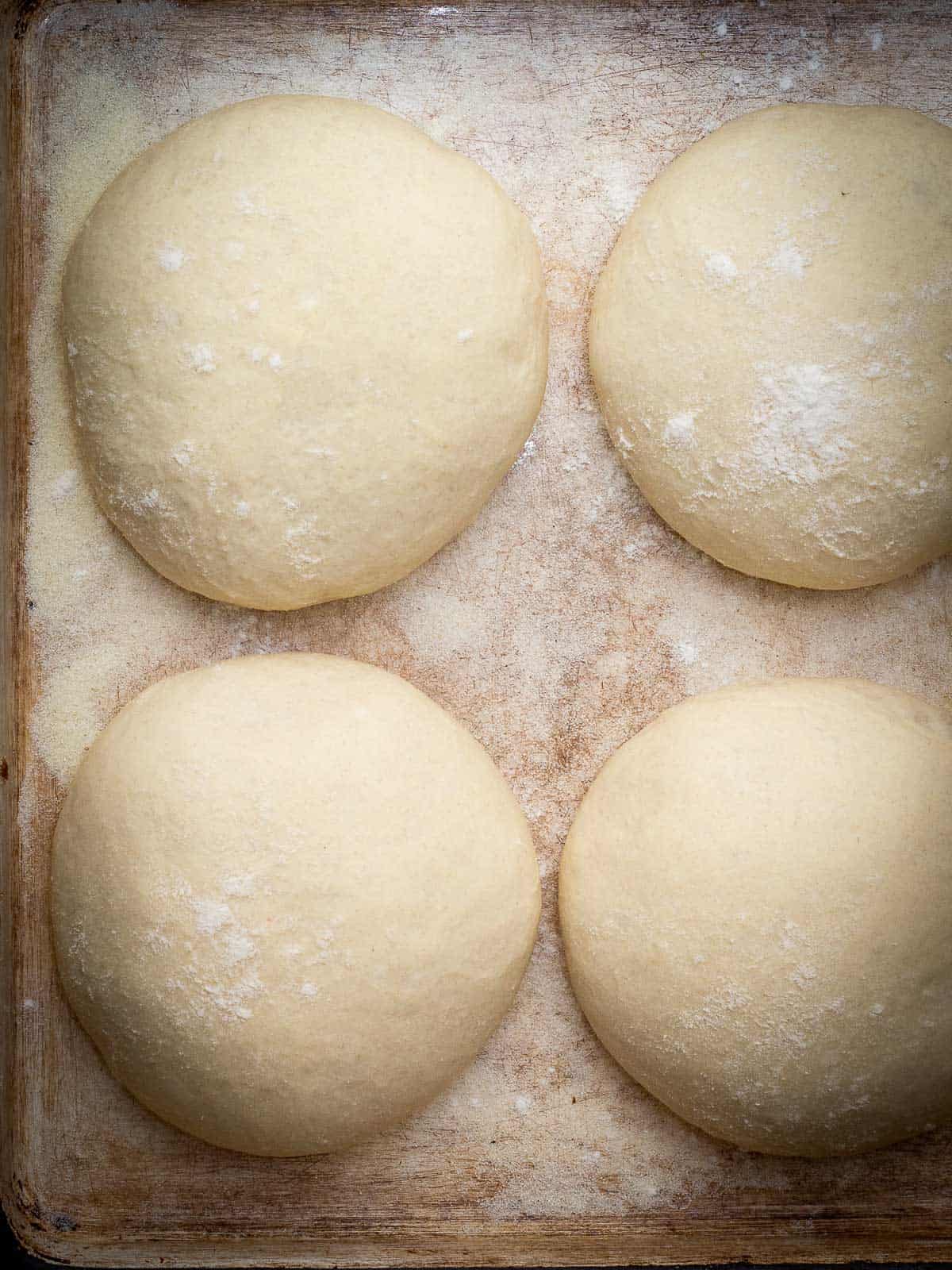
After 30 minutes, divide it and make 2-4 dough balls. Cover again and let rise.
Preheat oven for at least 15 minutes at maximum temperature (about 480 ºF, 250 ºC) before pizza making. You want it to be very, very hot.
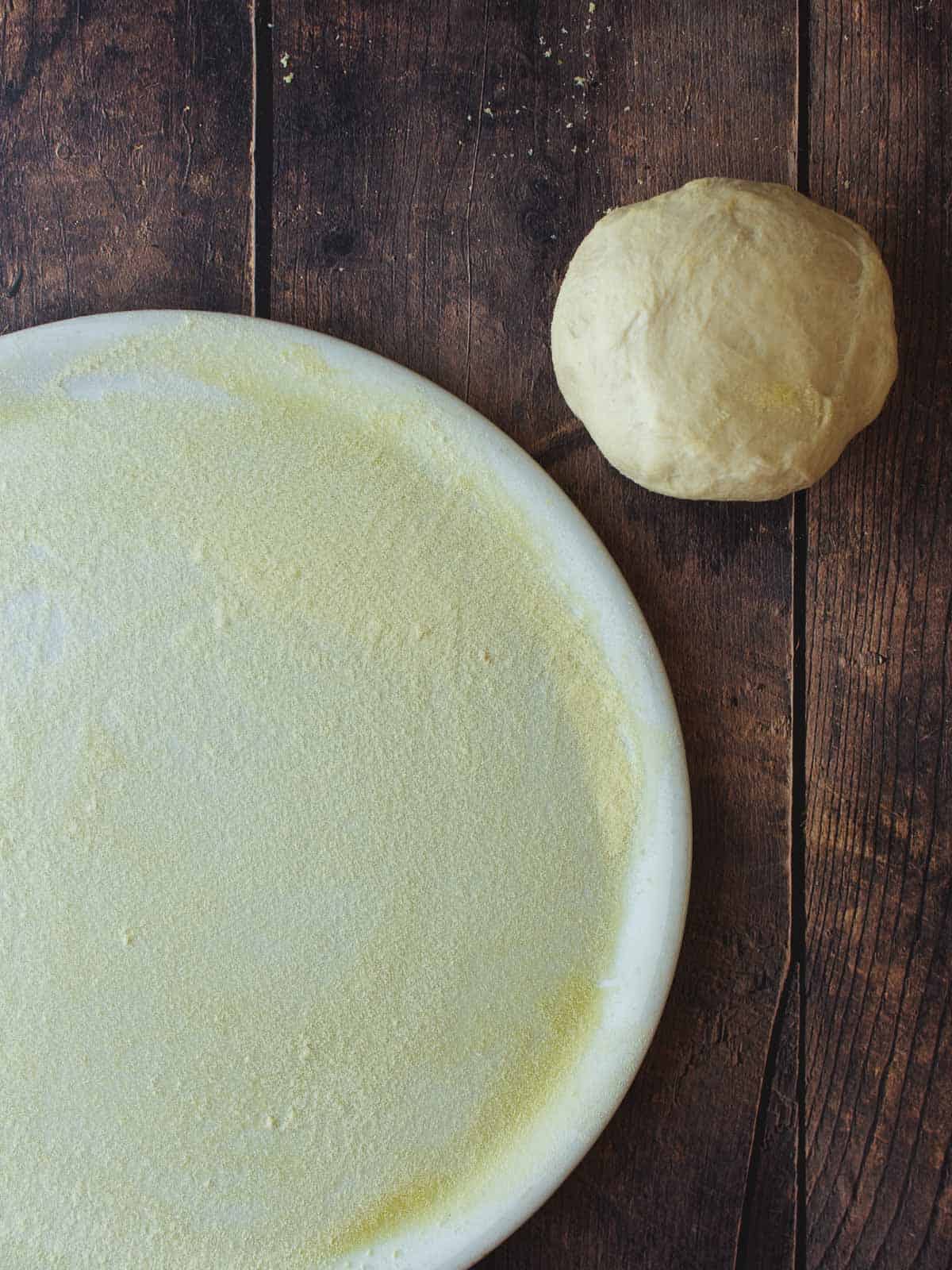
Lightly grease the pizza pan and then lightly flour the pizza stone or baking sheet with flour or semolina.
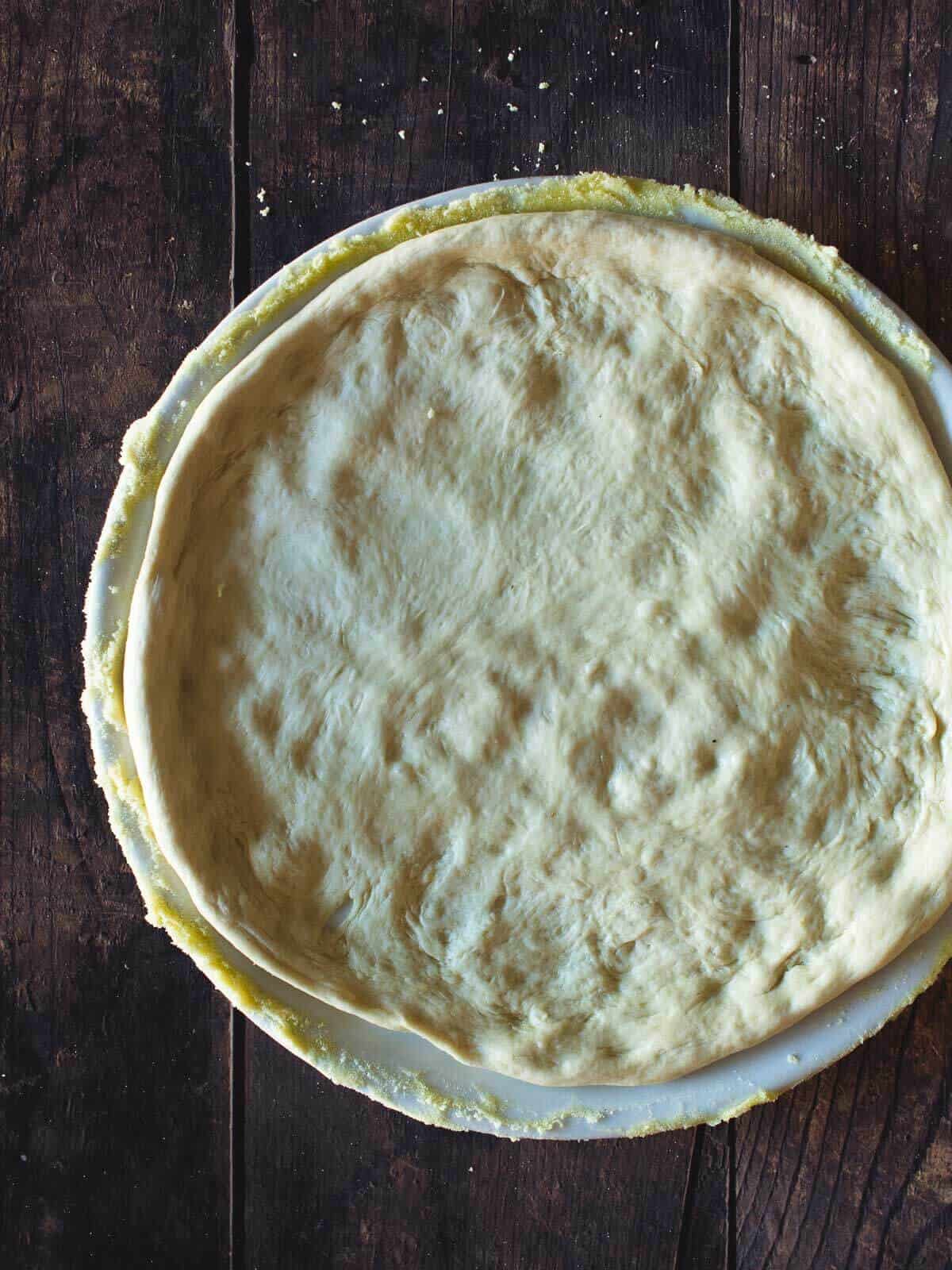
Transfer the dough to the baking sheet and stretch with your fingers from the center to the edges.
Tip: do not use a rolling pin; you want to keep the air inside of the dough. That way, you will get a thin crust with a fluffy border.
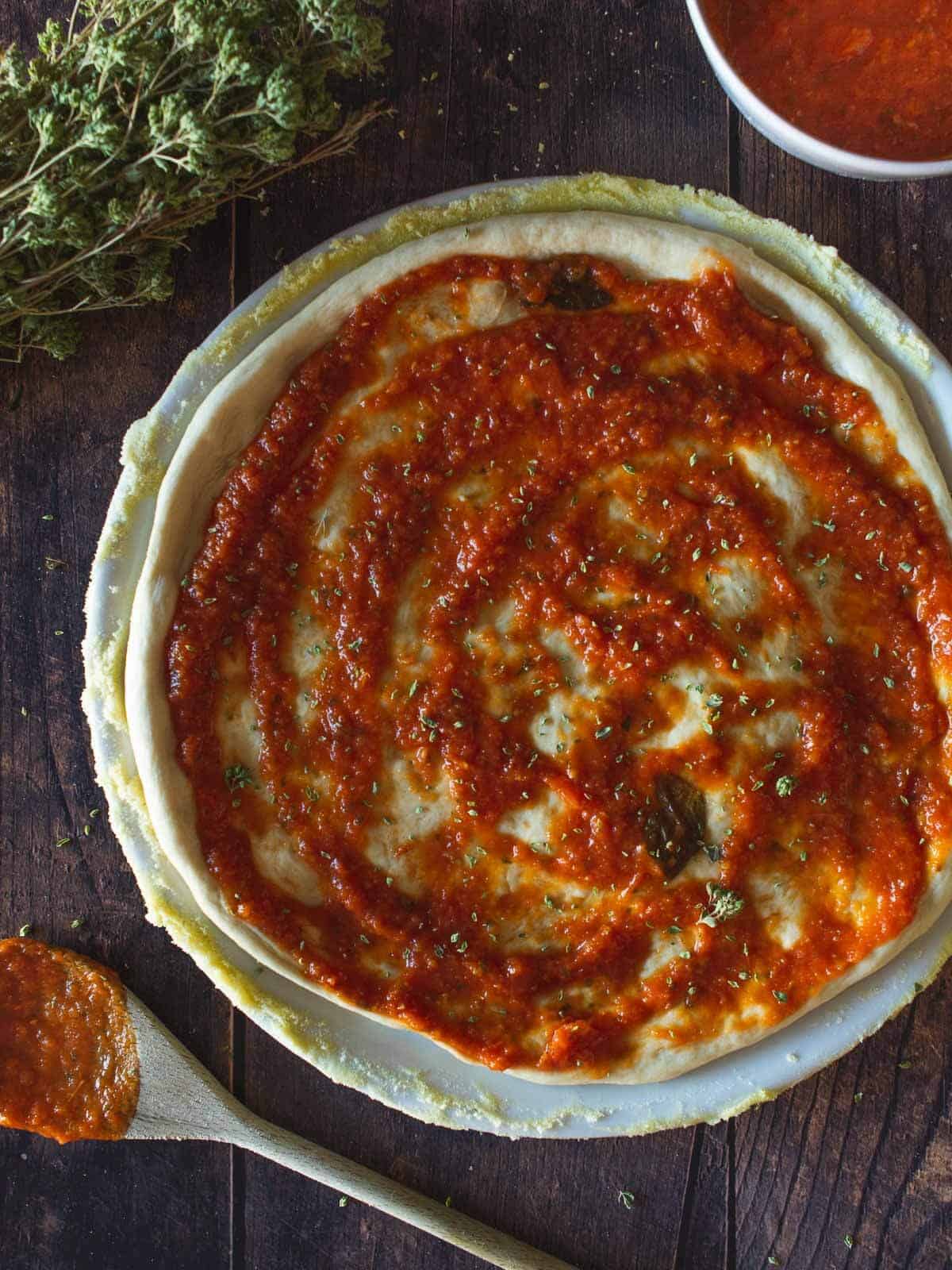
Add the tomato sauce to the pizza base.
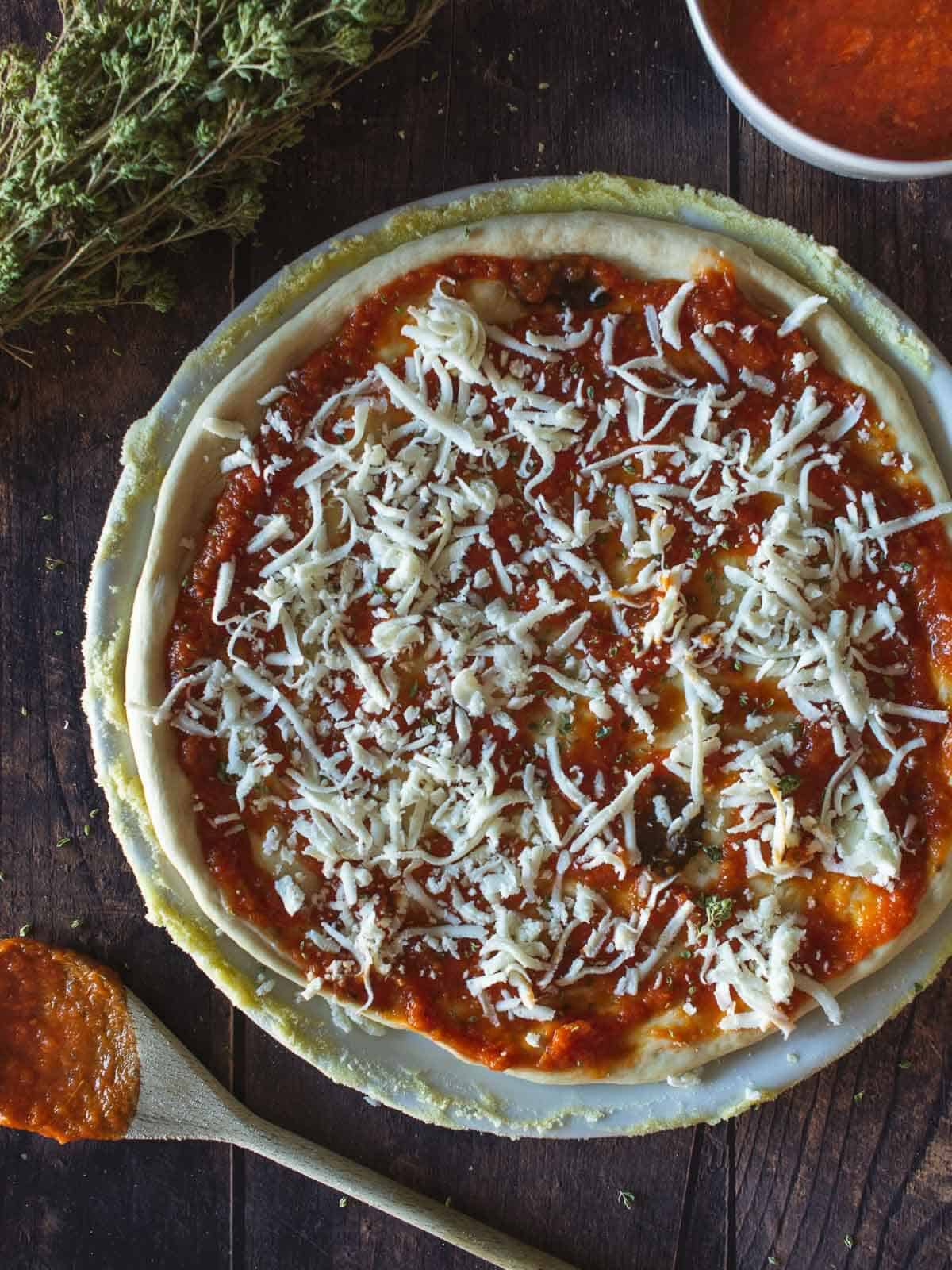
Sprinkle vegan mozzarella cheese.
Do not overload the pizza dough with mozzarella cheese; otherwise, the pizza crust won't reach the right consistency.
It's time to add your favorite pizza topping. If using leaves such as basil or arugula, add them after removing the pizza from the oven. Otherwise, they will wilt; otherwise, add other types of toppings at this moment.
This homemade pizza crust recipe only needs about 15 minutes of baking time as long as it is baked in a preheated oven. The perfect pizza should be golden brown and have, at most, a couple of dark brown spots.
If you are using a normal-sized oven, we recommend baking one pizza at a time so the heat is concentrated and cooks the pizza fast.
Remember that the professional ovens used in bakeries can reach much higher temperatures compared to most household ovens; that's why taking care of preserving the oven's heat is imperative.
Tip: if you are unsure about how even your oven heat is, put an oven-safe container on the bottom of the oven with a cup of water.
Here in Italy, when making a cheese pizza, it is common to have your pizza topped with buffalo mozzarella.
See the full recipe below.
Pro Dough Tips
To make the perfect homemade pizza dough follow the simple but extremely helpful tips. Don't be intimidated; you will incorporate them quickly and also be able to apply them to your baking recipes.
- The minimum amount of time I would recommend letting the dough rise is two hours, but I prefer leaving it to rise for three hours and even overnight.
- Make sure you leave the dough to rise at a warm temperature. For example, I leave it close to my house heater in winter, or also, you can turn the oven on to 100 ºF (50ºC) for ten minutes and then turn it off before turning the dough in.
- I love semolina and the sandy, dusty effect it has on pizza. I think semolina just makes the pizzas have more of a Sourdough texture, which I am all in for.
- When rising (proofing), cover the dough pieces with plastic foil. Air is the worst enemy of your dough. It will make a hard crust on it if you leave it uncovered.
- Put any oven-resistant pan on the bottom of the oven with 2 cups of water (this helps ensure the same temperature is homogenous if you don’t have an oven with a fan).
- Suppose you don’t have a Pizza Oven or a Clay Oven, which raises their temperature way above any conventional house oven. In that case, you need to increase the temperature to the maximum (about 480ºF or 250ºC) and let it pre-heat for twenty minutes.
- Do not open the oven until the pizza is ready! Otherwise, you will lose the temperature, and the dough will not forgive you.
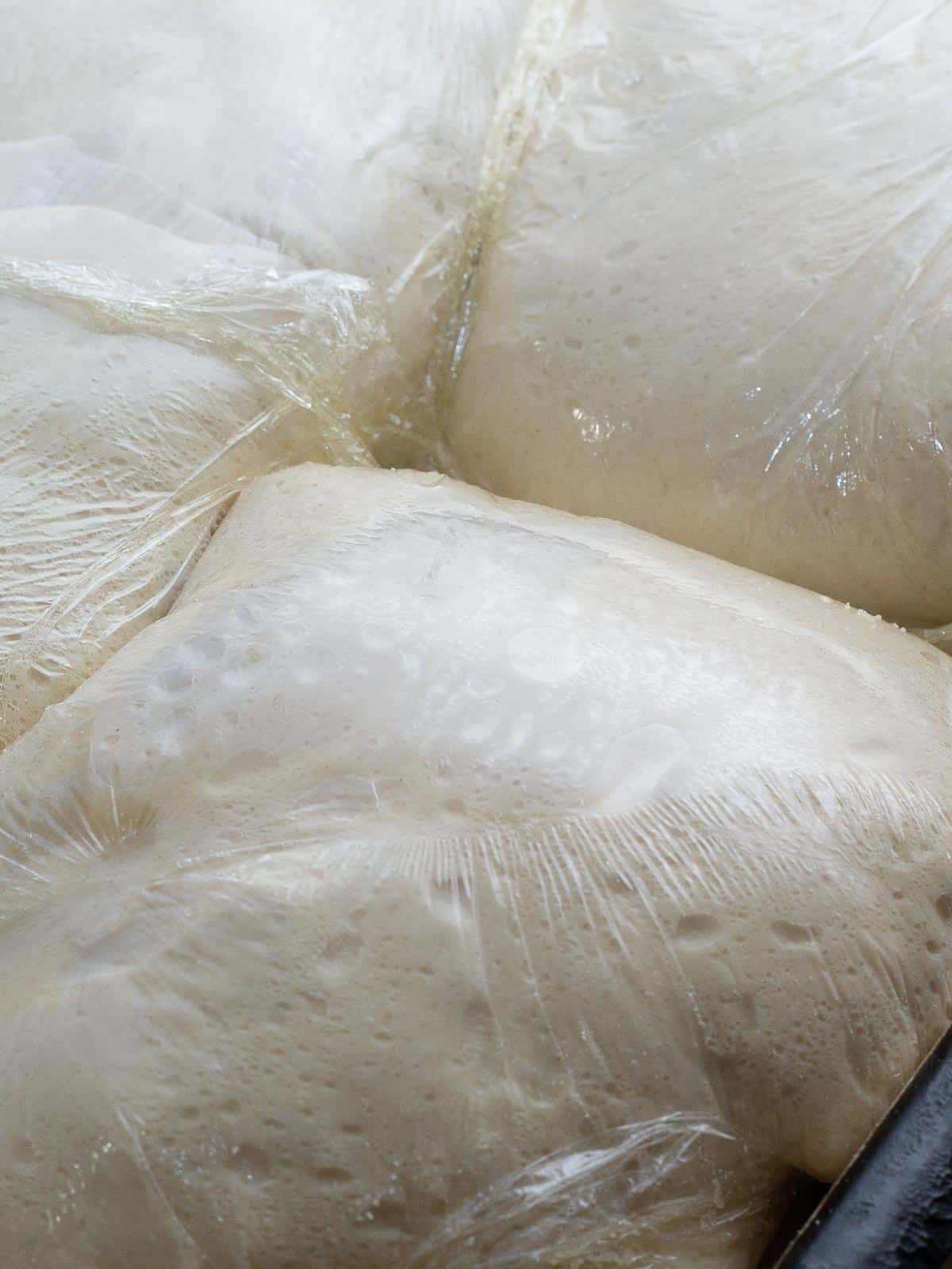
Flour
Flour type is a big deal when it comes to baking. I learned it the hard way. You just can’t use any flour for any dish. The zeros define the amount of gluten (protein) a given flour type has, thus what the flour is good for.
The fewer zeros, the more gas it would hold, and more gluten, and gluten is the protein that makes dough rise. If you use all-purpose flour (most likely a 000), it will not grow as a 0 or 00 one.
You can use both strong flour (one zero), and all-purpose flour, also known as bread flour (two zeros).
What's the difference? Strong flour, has more strength to proof, meaning the pizza crust can be airier, but for this to happen, you need to let it proof for more time, from 4-5 hours.
If you use bread flour (two zeros), the proofing time can be as low as 2 hours.
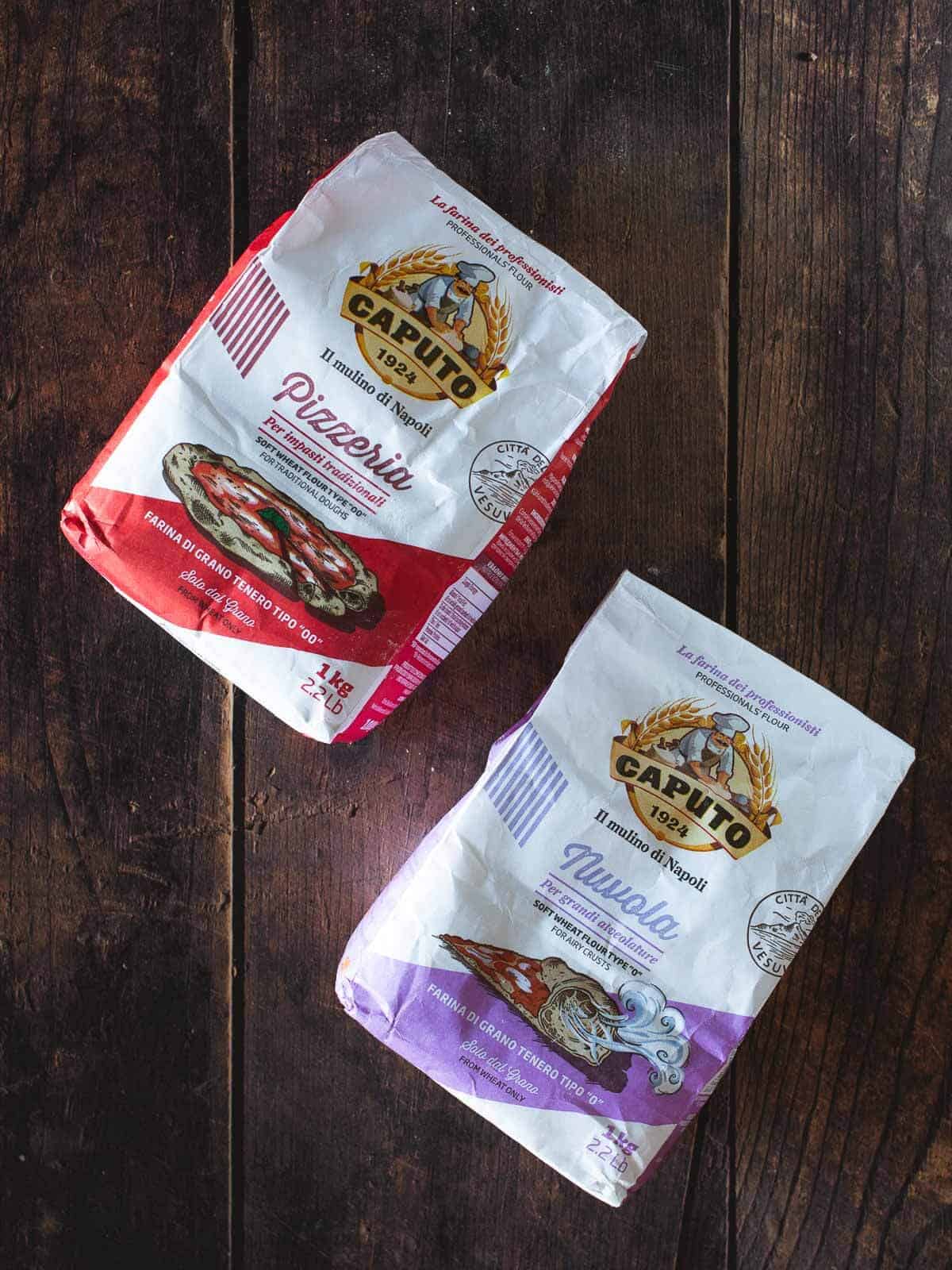
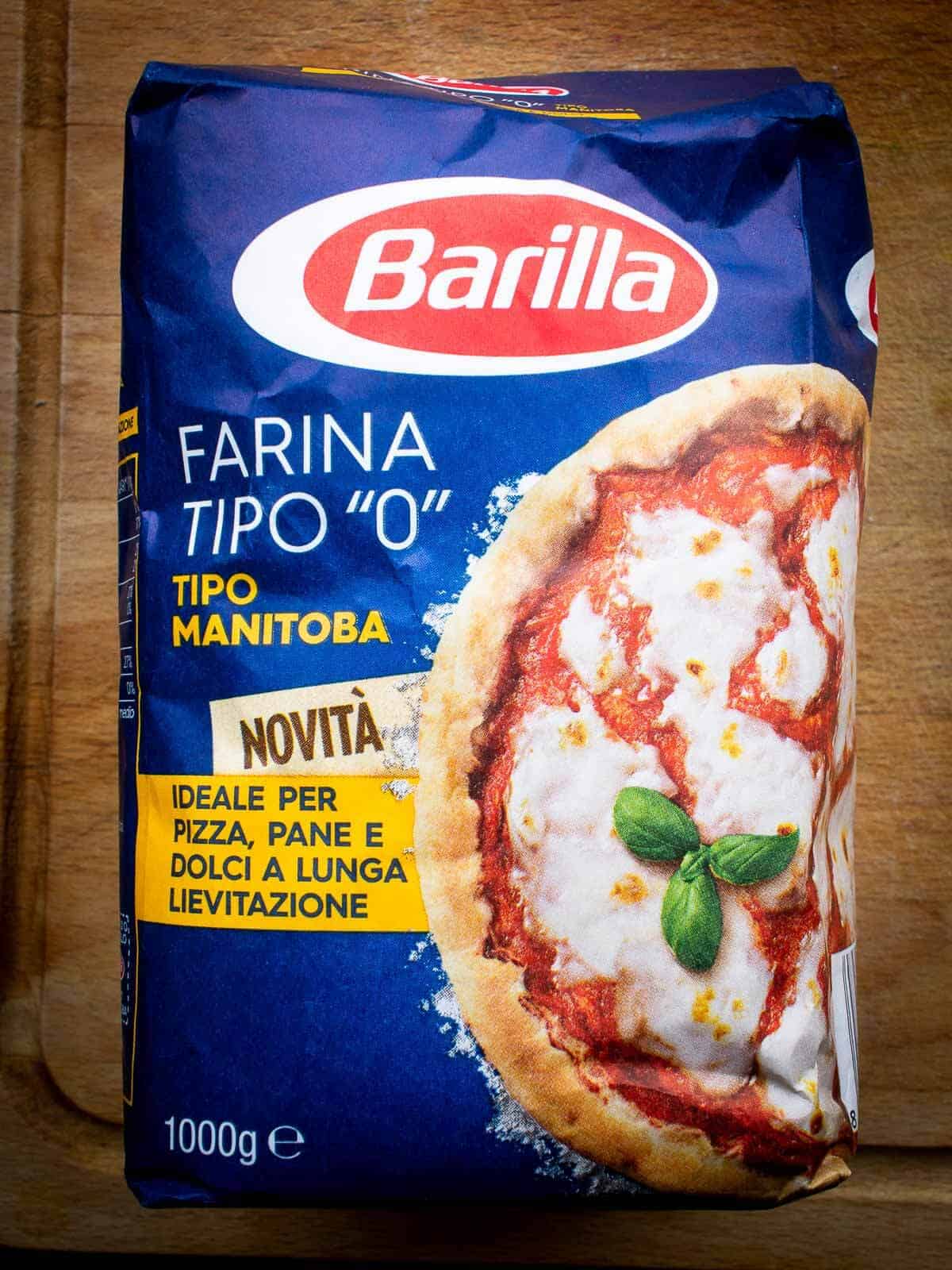
The more common flour used for baking cakes and dessert recipes is the 0000 type because you don’t want your cake to lose shape.
The 0000 is more refined and whiter, with little gluten formation; it is not a good gas container, and the bread loses shape. For this reason, it is only used in sliced bread and pastry, in cake batter, puff pastries, etc.
There is no better or worse flour; you must know what you want it for.
Tip: if you want your pizza to be airy but still flat, you can mix half all-purpose flour and half-strong flour. Make sure to increase the leavening time by one to two hours.
Yeast
This easy pizza dough recipe uses instant yeast, as it reduces the leavening time and complexity of the recipe. In fact, most of the pizzaiolos (pizza makers)and bread recipes use active dry yeast.
If you choose to use fresh yeast, also known as cake or compressed, make sure you use 3 times more.
Active dry yeast = ⅓ dose of fresh yeast
Yeasts are microorganisms from the fungus kingdom. They are alive; they hate salt and love sugar. So when you use salt, make sure it doesn’t come in direct contact with yeast; it will kill it the same way hot water will. Yeasts like warm water and sweets, don’t we all?
Most of the active dry yeast packages say you don't need to dilute yeats in warm water before using and that you can add it directly on top of all-purpose flour; but my experience, sugary warm water does help the yeast.
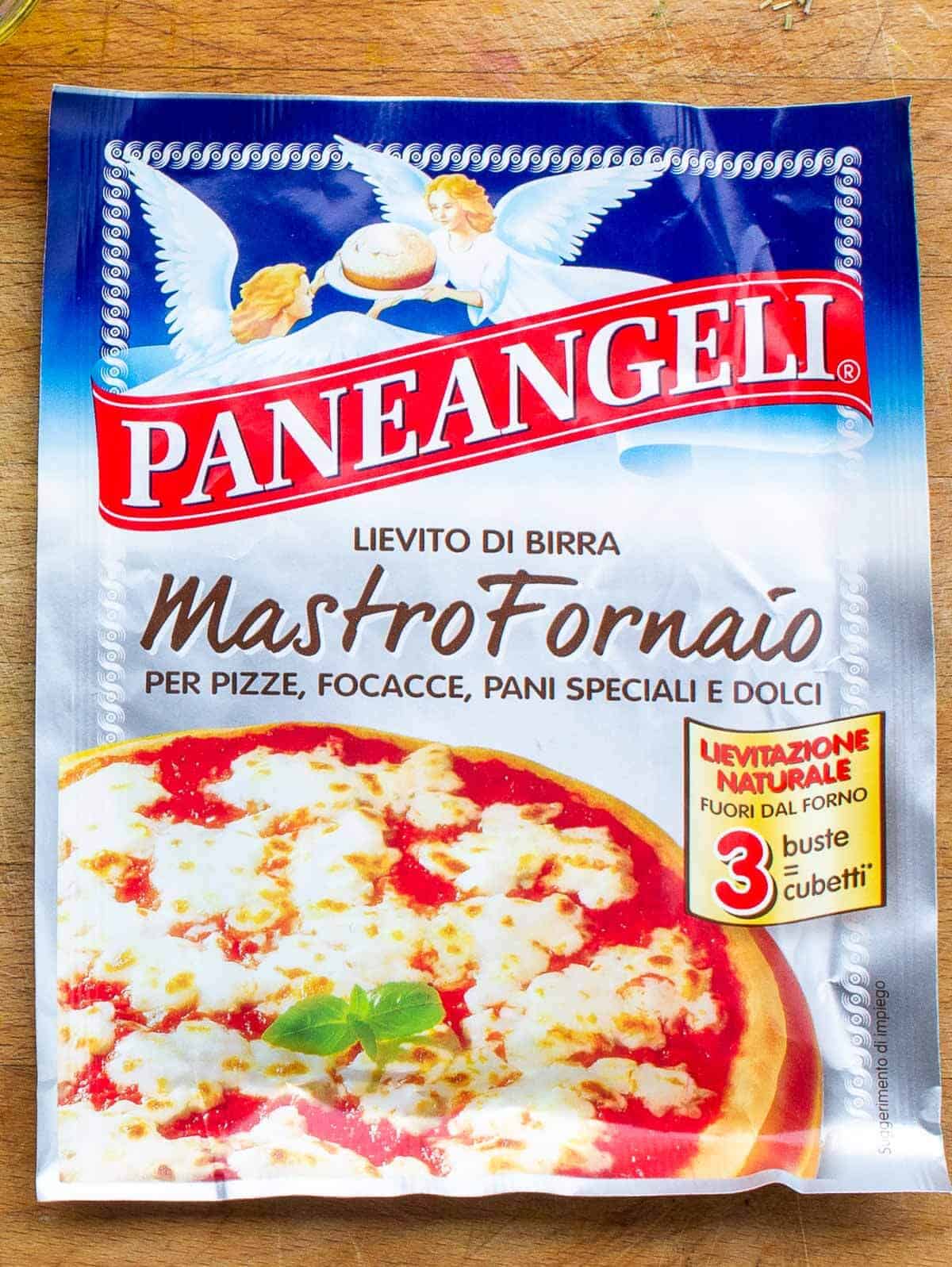
You can find both fresh and dry yeast; they both work; just follow the yeast package instructions.
Vegan Pizza Sauce
Do not get too inventive with the sauce. No onions, no red bell pepper. Please keep it simple; it works! Just use the best tomato sauce you can find (Italian Passata works well).
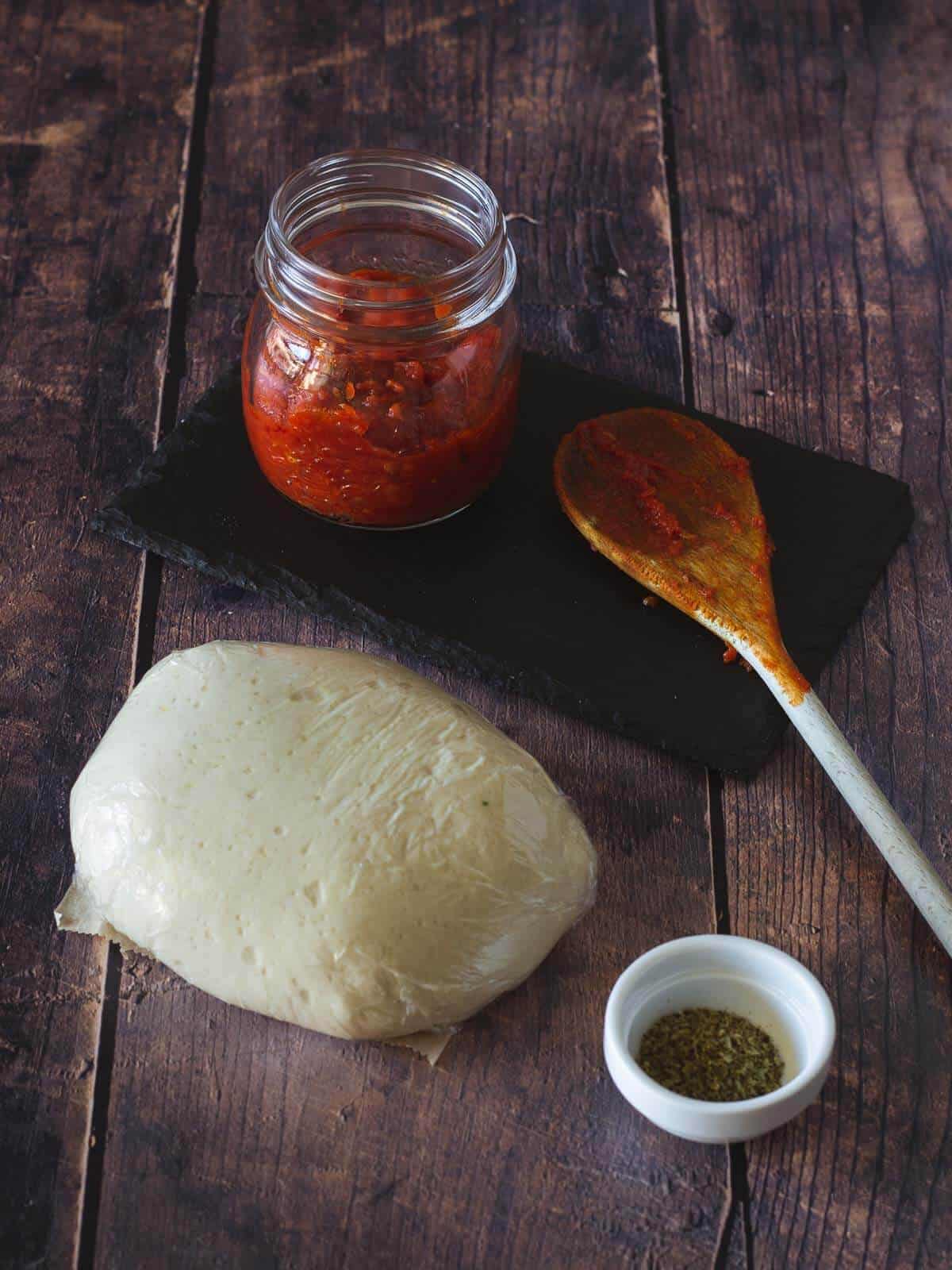
Or make your own; simply use blended extra ripe tomatoes using fresh or canned tomatoes.
Add a little extra virgin olive oil to a pan, followed by minced garlic and basil. Alternatively, you can use a teaspoon of Italian seasoning.
The best pizza shouldn't be soggy; use only a little amount of sauce, spreading it with the back of a wooden spoon, and make sure not to overload your fantastic homemade pizza dough's surface.
We usually make a marinara sauce for all types of pizzas, including the famous pizza marinara, a simple yet delicious, accidentally vegan pizza.
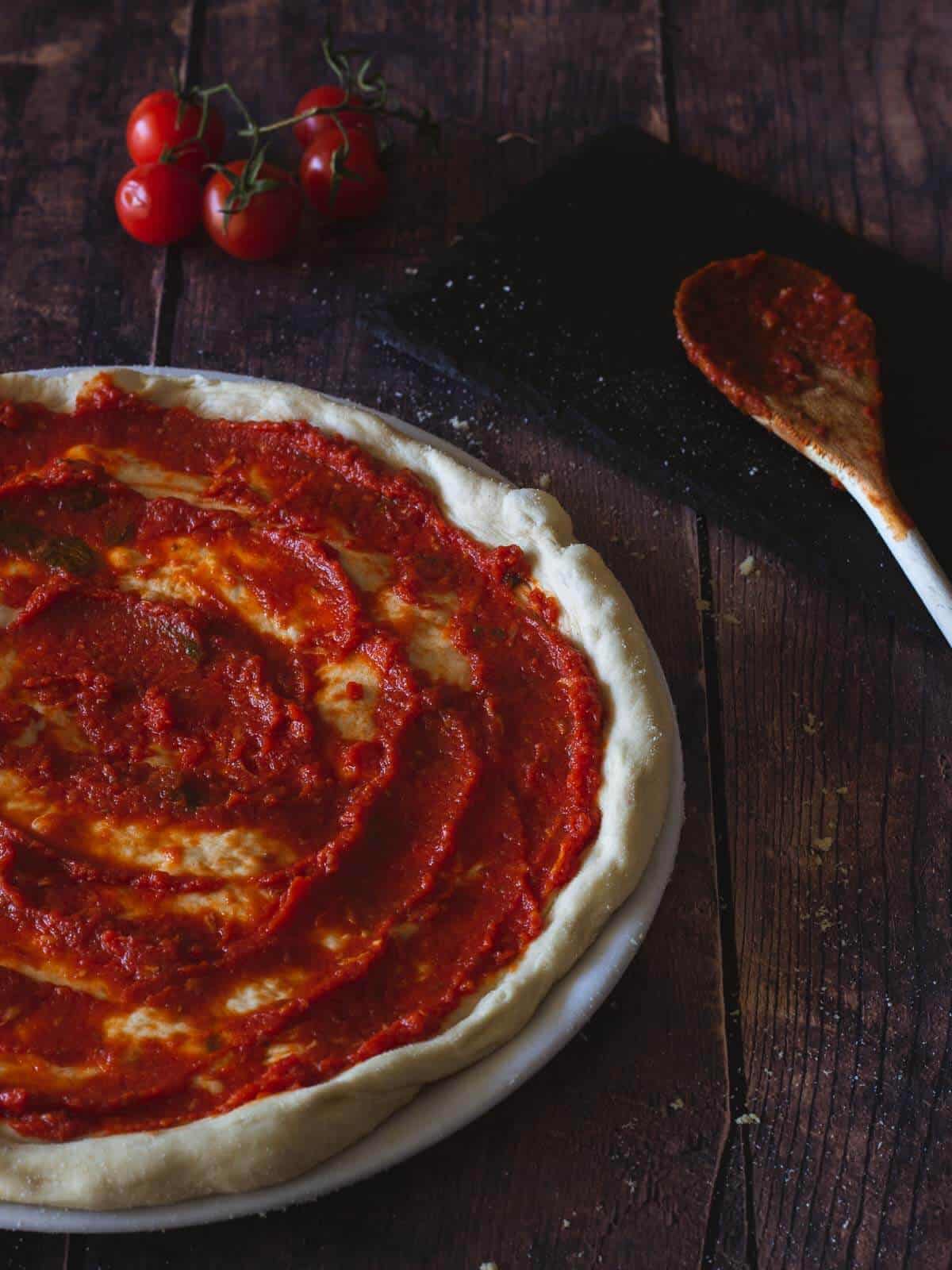
Assembling the pizza
For the Margherita Cheese pizza, the addition of fresh Italian basil is essential. However, it's important to add the basil right after the pizza comes out of the oven, as opposed to before, to prevent the leaves from wilting and turning black. The option to include sliced basil in the pizza sauce is also available, infusing the sauce with delightful herb flavor. If preferred, dried basil can be used as a substitute.
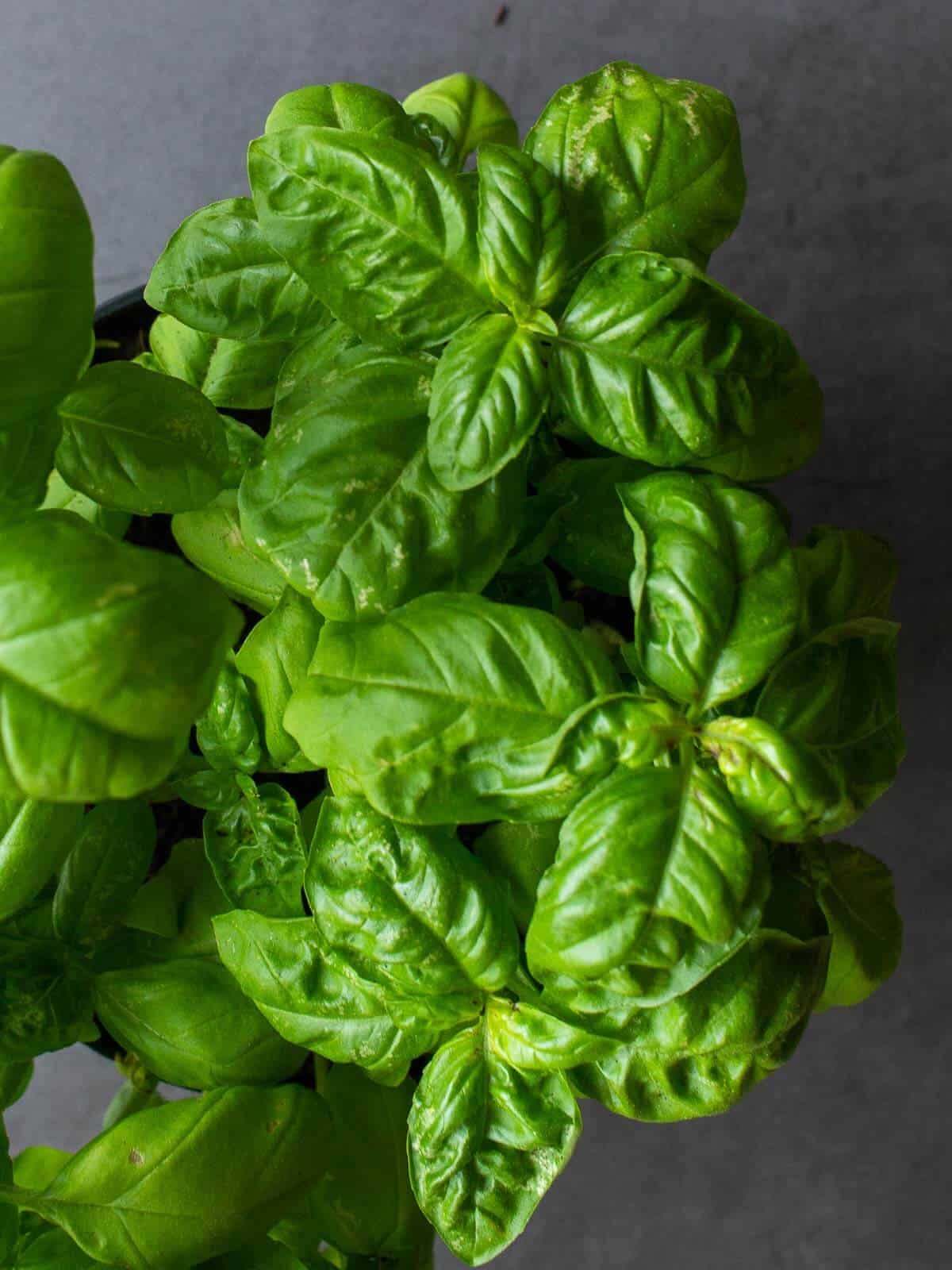
Best vegan mozzarella cheese brands in the US.
After extensive research, while spending time with our relatives in the US during the past months, we have gathered this list of vegan mozzarella options.
- Daiya Mozzarella Style Shreds
- Parmela Creamery Plant-Based Mozzarella
- Moocho Dairy-Free Mozzarella Style Shreds
- Miyoko's Creamery Vegan Pizza Mozzarella
- Violife Just Like Mozzarella shreds (affiliate link)
👨🏻🍳 Vegan pizza toppings
We all know that when it comes to vegetable pizza toppings, the sky is the limit; here, we will touch base on authentic veggie Italian pizza toppings that you can enjoy with your homemade pizza.
Tip: If you want to add fresh greens, such as spinach or arugula, to your pizza, try adding them after baking. This will help to preserve their vibrant color and prevent them from wilting or becoming overly cooked. Simply sprinkle the fresh greens on top of the hot pizza as soon as it comes out of the oven. The residual heat will slightly wilt the greens, enhancing their flavor and freshness. It's a simple step that can make a big difference in the presentation and taste of your pizza!
Authentic Italian Pizza Toppings
After making your homemade vegan pizza you need to master picking the right toppings!
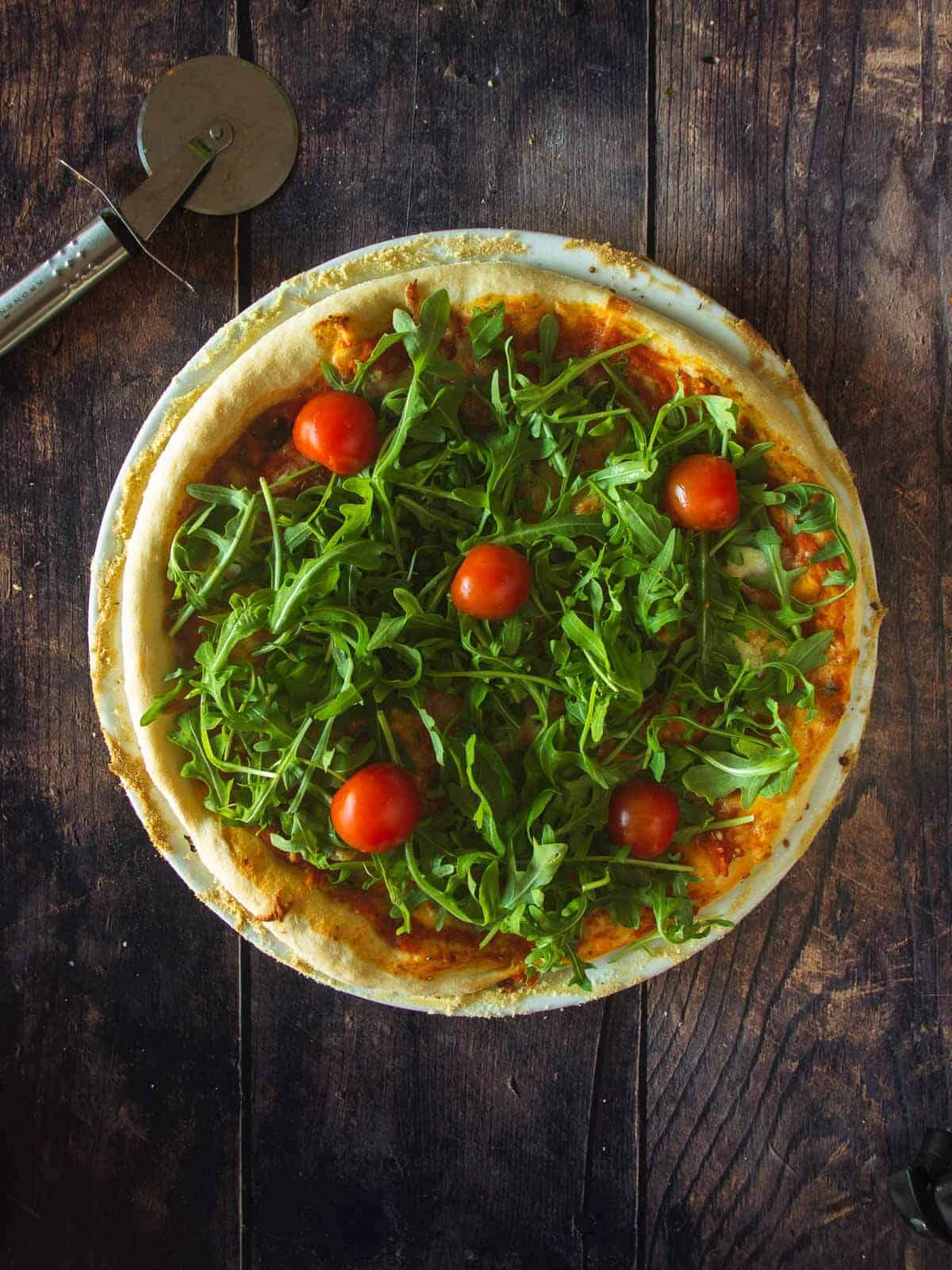
- Fresh arugula (one of our favorites, try pairing it with vegan blue cheese)
- Spinach, previously sauteed
- Black olives, whole or sliced
- Green olives, whole or sliced
- Marinated or grilled eggplant (or raw on top of the pizza before baking, or pre-grilled/roasted for added complexity)
- Marinated or grilled zucchini
- Marinated or grilled asparagus
- Cherry, plum, and grape tomatoes, raw or pre-grilled
- Porcini mushrooms (sliced fresh or pre-hydrated)
- Sliced cremini or portobello mushrooms (fresh or canned)
- Oregano (dried or fresh)
- Potato, previously seared
- Rosemary (dried)
- Red bell peppers (raw on top of pizza before baking or pre-grilled/roasted/canned for added complexity)
- Green or yellow bell peppers
- Roasted Pumpkin or butternut squash (if raw, very thinly slice them for them to cook well)
- Artichoke hearts (pre-cooked or canned)
- Garlic, raw and minced, sliced, whole-roasted, or crunchy pre-stir fried slices)
- Fresh basil (or sprinkled dried)
- Shaved truffles or truffle oil (arguably vegan)
- Crushed pistachio
- Pesto (see our homemade vegan pesto recipes for basil, sun-dried tomatoes, pistachio, and Arugula pesto recipes)
- Sliced onions (or previously caramelized)
- Sun-dried tomatoes (pre-hydrated or canned for a chunky texture)
- Kale (Cavolor Nero)
- Capers
Most popular Italian pizza cheese toppings
While all the options mentioned are wonderful, our recommendation is to choose vegan mozzarella cheese. It's crucial to opt for a high-quality brand that suits your taste preferences. This list serves as a guide to understand which flavor profiles complement the pizza best. Visit your nearest vegan-friendly grocery store to find the perfect vegan cheese for your culinary creations.
- Mozzarella cheese
- Ricotta cheese ((check our vegan ricotta cheese recipe)
- Gorgonzola cheese (blue cheese)
- Buffalo mozzarella
- Scamorza and smoked scamorza
- Parmigiano-Reggiano (check our vegan parmesan cheese recipe)
- Provolone
- Grana padano
- Goat cheese
Unusual Pizza toppings
- Vegan pulled jackfruit (simulated meat-like texture and flavor)
- Vegan chorizo crumbles
- Sliced avocado (before serving)
- Vegan cream cheese dollops
- Roasted butternut squash cubes
- Caramelized onions (see how to make it in our area recipe)
- Vegan kimchi
- Pickled jalapeños
- Vegan buffalo cauliflower (spicy and tangy)
- Sliced figs (for a sweet and savory combination)
- Vegan cashew cheese (homemade or store-bought)
- Vegan barbecue sauce swirls
- Vegan ranch dressing drizzle
- Spicy vegan mayo dollops
- Vegan feta cheese
- Pineapple
- White grapes
- Vegan bechamel sauce
- Sliced pear or roasted with fennel
- Vegan sausage or plant-based protein crumbles
- Tofu Teriyaki puffs
- Vegan pepperoni slices
- Vegan bacon bits
- Roasted red pepper hummus dollops
🍽 Equipment
For optimal results with this straightforward recipe, we highly advise baking your pizza on a pizza stone or pizza pan. It's best to avoid using baking sheets with edges.
When it comes to shaping the pizza dough, it is recommended to refrain from using a rolling pin. While it may seem tempting to stretch the dough, doing so can eliminate the wonderful air bubbles in the bread.
To streamline your preparation process, use a spacious bowl to mix the dough before transferring it to the kneading surface. This will facilitate your work. Remember to vigorously slam the dough against the kneading surface to activate the yeast effectively.
Using a stand mixer can get your hands off the kitchen for 20 minutes. We love kneading, but it can certainly be useful when hosting a pizza party.
Cut the pizza either with a pizza wheel (affiliate link) or a chef's knife (affiliate link).
To make the pizza sauce, we recommend using a skillet (affiliate link) with a lid because thick tomato sauce tends to sprinkle vigorously.
🥡 Storage
Store the pizza dough for up to 5 days in the fridge. When properly stored, using a resealable freezer bag for your own pizza dough can last up to 5 days in the fridge or even up to 3 months in the freezer.
The best storage time will strongly depend on the amount of yeast used in the pizza dough. Generally speaking, the less yeast in the pizza dough, the longer it will keep.
❄️ Freezing Pizza dough
Freezing pizza dough is a great way to have homemade dough readily available for future use. Here's a simple guide on how to freeze pizza dough:
- Prepare the dough: Follow your preferred pizza dough recipe and let the dough rise and rest according to the instructions.
- Divide and shape the dough: Once the dough is ready, divide it into individual portions based on the size of pizzas you want to make in the future. Shape each portion into a ball.
- Wrap the dough: Individually wrap each dough ball tightly with plastic wrap or place them in separate airtight freezer bags. Make sure to remove any excess air from the bags to prevent freezer burn.
- Label and date: Write the date and label the dough portions to keep track of their freshness.
- Freeze the dough: Place the wrapped dough portions in the freezer and let them freeze completely. Ideally, the dough should be frozen within a few hours of preparation.
- Thawing and using the dough: When you're ready to use the dough, transfer the desired number of portions to the refrigerator and let them thaw overnight. Once thawed, you can proceed with rolling, shaping, and topping the dough as you would with fresh dough.
Remember, it's best to use the frozen dough within 1 to 3 months for optimal quality. Freezing times and results may vary depending on the specific dough recipe and your freezer's performance. Enjoy the convenience of having homemade pizza dough at your fingertips whenever you're in the mood for a delicious homemade pizza!
💡 Tips for Enjoying Pizza without Offending Italian Pride 🇮🇹
Please note that the following guidelines are not personal opinions, but rather a compilation of "rules" gathered from my experience living in Italy and interviewing chefs and locals from different regions. Here are some insights we've gathered:
- Toppings: Avoid adding unconventional ingredients like ketchup to your pizza. In Italy, Hawaiian pizza is generally considered unacceptable. This may sound straightforward, but it's an important distinction here.
- Eating Style: Pizza is meant to be enjoyed by hand, so using forks is generally frowned upon. While this is an easy rule for most, it may differ for certain individuals.
- Shape: Traditional Italian pizza is round, and deviating from this shape is not recommended. Rectangular pizzas, like the Pinsa, have their own distinct identity. However, it's important to note that rectangular shapes are typically reserved for pizza slices sold at bakeries and street-front shops.
- Slicing: Triangular slices are the norm in Italy, so avoid cutting your pizza into squares or other shapes. It's a small detail that holds significance here.
- Individual Portions: In restaurants, pizzas are typically served as individual portions. It's not common to order a pizza for two adults, although sharing with kids is usually acceptable. Italians have their ways of staying in shape, after all!
While these guidelines exist, there is still room for creativity when it comes to toppings. Italy itself boasts a wide range of inventive and delicious pizza variations. So feel free to explore the culinary artistry of Italian pizzas while keeping these cultural preferences in mind.
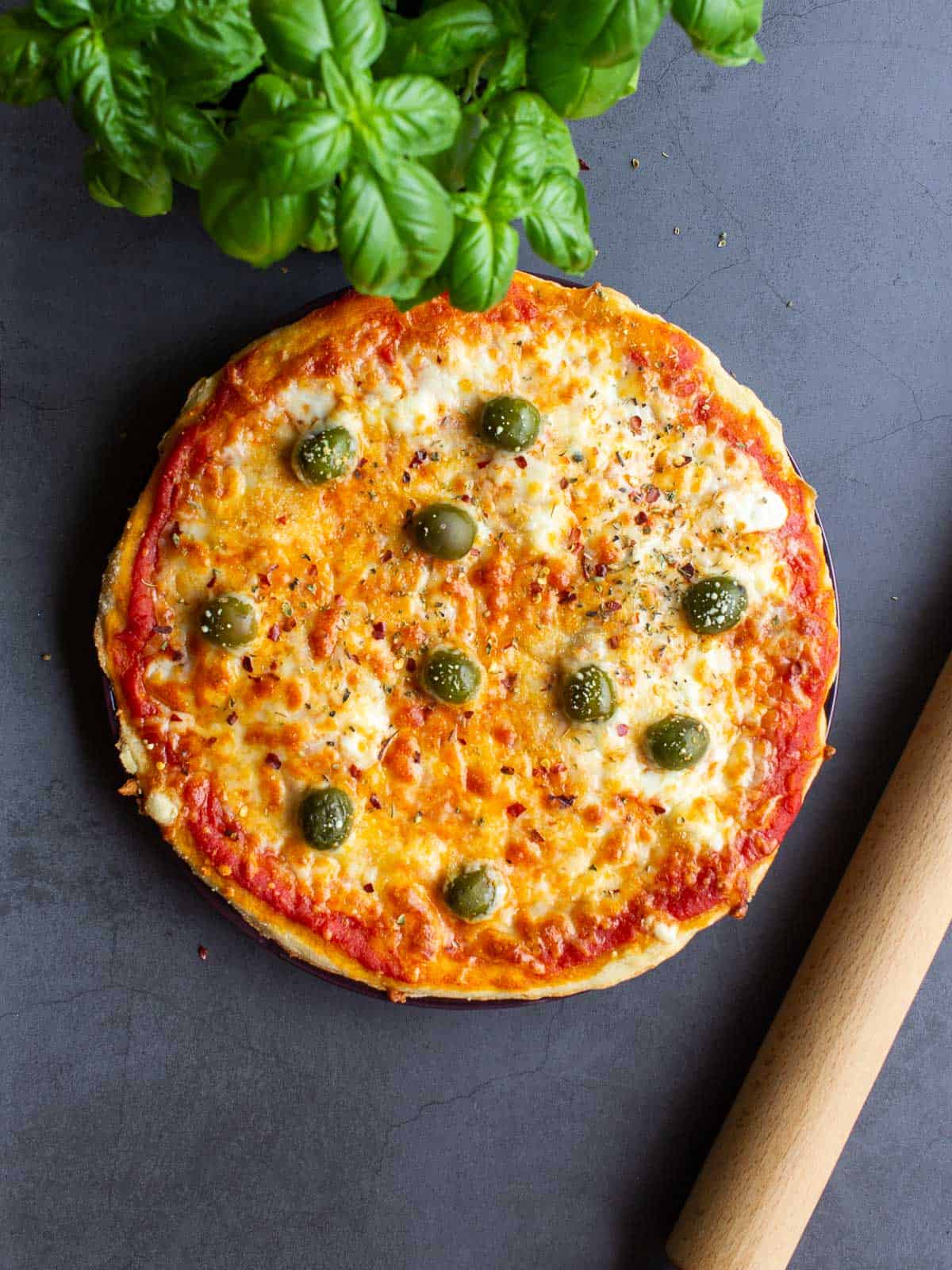
You will find not less than twenty types of pizzas in every Pizza Shop.
The usual variations and customizations are:
- Type of flour: Bran flour vs. Normal
- Sauce: White vs. Red Sauce Pizza
- Border: option for a filled border. This one is arguable, but hey!… I live here, and I have seen many pizza delivery services that offer this option).
🍕 Differentiating Pizza Styles
When it comes to naming pizzas, it's crucial to distinguish between a Neapolitan Pizza and a Roman Pizza. As long as you're accurately identifying these pizza types, you're on the right track!
The key distinction lies in the dough:
Neapolitan Pizza is crafted using only flour, yeast, water, and salt. This classic recipe results in a particular texture and thickness.
Conversely, Roman Pizza incorporates olive oil into the dough, allowing it to be stretched further and yielding a thinner crust.
Understanding these variations will help you appreciate the unique qualities of each pizza style and navigate the pizza world with confidence.
There is also the Pinsa Romana, which:
- It has a rectangular shape.
- The dough is made with a specific combination of flours.
- It is raised for a specific amount of time.
- A Pinsa does not have cooked ingredients on top.
I will dedicate another post to the Pinsa Romana soon!
The mindset that drives all these specificities is the same as the one for wines and distyles. It all comes to what ingredients are being used, their origins, and the cooking and processing methods.
📚 More dough recipes
See how to make your own vegan pasta dough, lentil vegan empanadas, vegan empanadas dough, Italian pagnotta easy bread loaf, and focaccia bread.
⭐ If you try this recipe, let us know! 💬 Leave a comment, rate it, and don't forget to tag us @ourplantbasedworld on Instagram. Cheers!
Ready to knead? It will be fun!
⭐ If you try this vegan pizza recipe, let us know! 💬 Leave a comment, rate it, and don't forget to tag us @ourplantbasedworld on Instagram. Cheers!
📋 Recipe

Vegan Cheese Pizza, Dough Recipe & Popular Veggie Italian Pizza Topping
Equipment
Ingredients
Dough:
- 1 lb bread flour (0 Flour) full strong manitoba flour, you will need about 2 ounces extra flour to manage
- 2 tablespoons olive oil extra-virgin
- 1 teaspoon sea salt
- 1 teaspoon cane sugar organic
- ¼ ounce dry brewer’s instant yeast approx. 2-¼ teaspoons, or 7 g
- 11 fluid ounces warm water
- 5 ounces vegan mozzarella cheese or regular mozzarella if vegetarian
- 2 tablespoons homemade vegan parmesan cheese freshly grated (disregard if going for a vegan option)
Optional:
- 1.5 ounces semolina hard durum wheat
Optional (my favorite toppings):
- green olives
- red pepper flakes to sprinkle
- fresh basil or arugula
- mushrooms sliced
Sauce:
- 24 ounces tomato sauce organic Italian passata
- 2 tablespoons olive oil extra-virgin
- 2 cloves garlic finely chopped
- 1 cup basil fresh leaves
- 1 teaspoon cane sugar organic
- 1 teaspoon sea salt
Directions
For the Vegan Pizza Sauce:
- Grind or finely chop the garlic and fry in the olive oil on medium heat for 30 seconds.2 cloves garlic, 2 tablespoons olive oil
- Add thetomato sauce, half of the basil leaves, sugar and salt.1 teaspoon sea salt, 24 ounces tomato sauce, 1 cup basil, 1 teaspoon cane sugar
- Cook for twenty to thirty minutes until it has reduced one-third, you should be left with two cups out of the initial three cups of tomato sauce. It should be thick.
- Remove fromheat and add the remaining basil leaves. Taste for salt. Let it rest.
For the Vegan Pizza Dough:
- Dilute the sugar and yeast in the water. Let it rest for 10 minutes. You should see some bubbles on top of the mix.1 teaspoon cane sugar, ¼ ounce dry brewer’s instant yeast, 11 fluid ounces warm water
- Meanwhile, mix 14 ounces (400 grams) of flour, two-thirds of the semolina, salt, and olive oil, in a bowl.1 lb bread flour (0 Flour), 1.5 ounces semolina, 1 teaspoon sea salt, 2 tablespoons olive oil
- Add the yeast water. Mix it. It should be sticky.
- Remove from the bowl, stretch and fold it for 20 minutes, adding the remaining flour if needed.
- Divide the dough into two pieces.
- Place each piece on an oiled pizza stone. Drizzle olive oil on top of each piece until they are fully covered, then cover them with plastic foil. Air is the worst enemy of your dough. It will make a hard crust on it if you leave it uncovered.
- Let it rise for a minimum of two hours. It should be close to a warm place in your kitchen or close to a heater.
For the cheese pizza:
- Pre-heat your oven at 480ºF (or 250 ºC).
- Put any oven-resistant pan on the bottom of the oven with 2 cups of water (this helps ensure the same temperature is kept even in the oven (if you don’t have an oven with a fan).
- Oil a pan with olive oil.2 tablespoons olive oil
- Add the semolina so it sticks to the oil in the pan.1.5 ounces semolina
- Stretch the pizza dough in it until you have a diameter of 12 inches (30 cm).
- Add ¾ cup of tomato sauce and spread it widely (resist the temptation to add too much sauce, or it will make the dough too moist).24 ounces tomato sauce
- Shred the mozzarella cheese or burrata and spread it on top of the sauce.5 ounces vegan mozzarella cheese
- Optionally add three tablespoons of freshly grated parmesan cheese and one tablespoon of olive oil.2 tablespoons homemade vegan parmesan cheese, 2 tablespoons olive oil
- Add any non-leafy topping like olives or mushrooms. Do not add leafy toppings at this point. Otherwise, they will not look fresh when serving the pizza.mushrooms, green olives
- Bake for fifteen minutes and take it out of the oven.
- After taking it out of the oven, optionally add any leafy greens like fresh basil or arugula.fresh basil, red pepper flakes
Notes
Nutrition Facts
Nutritional Disclaimer
The information shown is an estimate provided by an online nutrition calculator. It should not be considered a substitute for a professional nutritionist's advice. See our full Nutritional Disclosure here.
Affiliate Disclaimer
Please note that some of the links here are affiliate links, and I will earn a commission if you purchase through those links. I recommend all of the products listed because they are companies I have found helpful and trustworthy.
As the lead content writer and recipe developer at Our Plant-Based World, he combines his passion for health and sustainability with a Plant-Based Nutrition Certification to create accessible, delicious vegan recipes. His expertise in plant-based cooking supports the blog's mission of fostering a healthier, environmentally conscious lifestyle through simple and seasonal dishes. His commitment to making vegan cooking enjoyable and inclusive for everyone shines in each recipe and article.

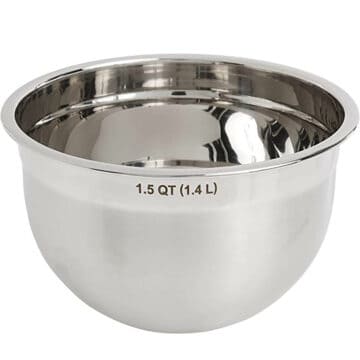
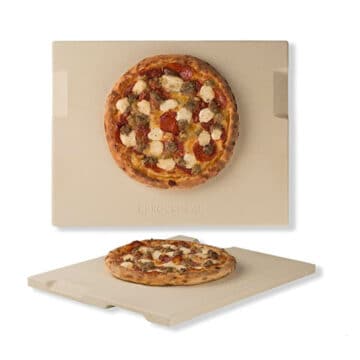
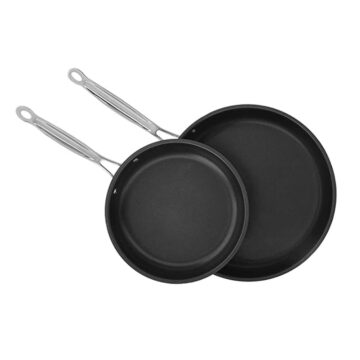
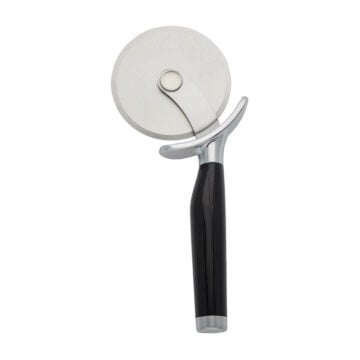


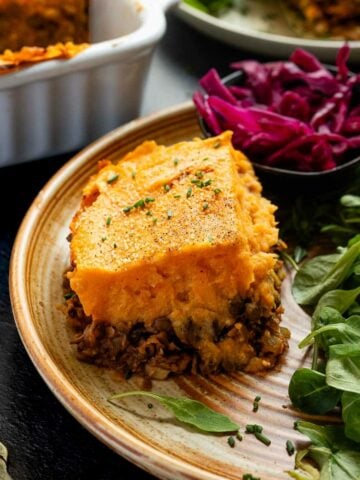

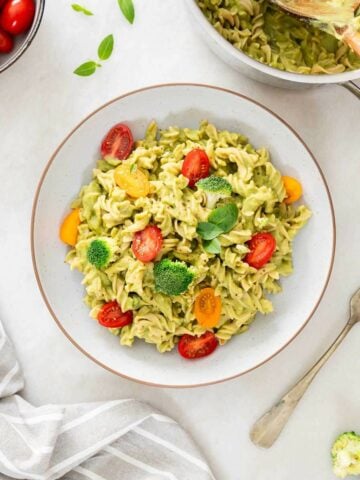
Katie
This is the BEST vegan pizza dough recipe! It bakes perfectly, and the crust gets crisp. There's no flop in the middle of the pizza, and it has the perfect flavor! This is my go-to pizza recipe now!
Holly
I switched up the vegetable toppings to suit what I had on hand but kept the dough and sauce. Both are fabulous! We've started doing regular pizza nights at home and these are my new base recipes. Thank you!
Gus
Thank you so much for your amazing 5-star review! We're thrilled to hear that you enjoyed our pizza recipe and found it versatile enough to switch up the vegetable toppings to your liking. We're glad the dough and sauce worked well for you and that you've made it your go-to base recipes for regular pizza nights at home.
At our core, we aim to provide delicious and customizable recipes that cater to individual preferences. It's wonderful to know that our recipe has become a staple in your kitchen. Your satisfaction means the world to us, and we appreciate your support.
xoxo
Andrea
This homemade pizza dough turned out absolutely amazing! It was so easy to make and was perfect for pizza night! Will revisit this recipe again and again!
Erin
This basic pizza recipe is solid. Thanks for all of the great tips! This is our new go-to pizza recipe!
Gus
That's cool Erin! thank you!
Tayler Ross
This is my absolute favorite pizza recipe! I've tried lots, but this is by far the best I've had. Thanks for sharing!
Gus
Hey Tayler! thanks for your review! I am our Margherita pizza made it all the way to the top on your list! 🙂
Elaine
How simple, yet delicious, this recipe is! Fantastic pizza that is great to make for when your friends come over...
Gus
I am glad you liked the pizza recipe, Elaine! Thanks for your review.
Andrea
Had to laugh at "rules to eat pizza without hurting Italian's pride" because those are the rules in my house. I love your recipe and will be giving it a try very soon.
Gus
That's cool Andrea! Seems like Italians have made them very clear! We also have those rules hahah!
Sara Welch
This was everything a gourmet pizza should be, and then some! Easily, a new favorite recipe; my whole family loved it!
Dana
Italians definitely get salty when you "mess" with their food. I found that out when I'd posted about the ricotta in my lasagna on Instagram. Boy, did they rage. Lol. Love this dough recipe, it's so crisp and easy to make! We do homemade pizzas every friday night so this is a keeper.
Danielle Wolter
I love how detailed and thorough the steps were. Made making this so easy and it was delicious!
Gus
We are glad you enjoyed making the recipe!
Heather Perine
OH you had me at pizza! I bet the 00 flour makes a big difference. Trying this for our next Friday pizza night 🙂
Gina
Love all these tips and thank you for saying pizza should be eaten by hand! Drives me nuts when you can't even hold a slice in your hand because it just collapses!
Gus
I know! Drives me nuts as well! We are glad you enjoyed the tips!
Kate
There are SO many brilliant tips here, thanks so much. I've just got a new pizza oven so bookmarking this to refer back to often!
Gus
Makes us really glad! I am sure that the pizza oven will make wonders!Enjoy!
Katherine
Thanks for all the great tips for the perfect pizza crust!
Gus
You are welcome! Enjoy the perfect crust pizza! 🙂